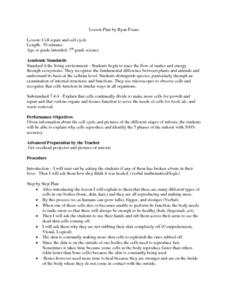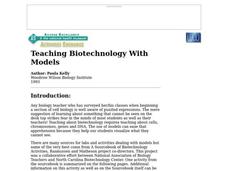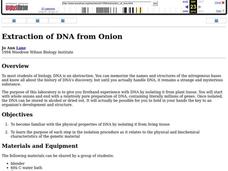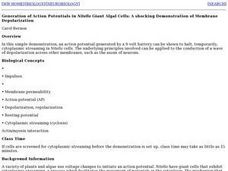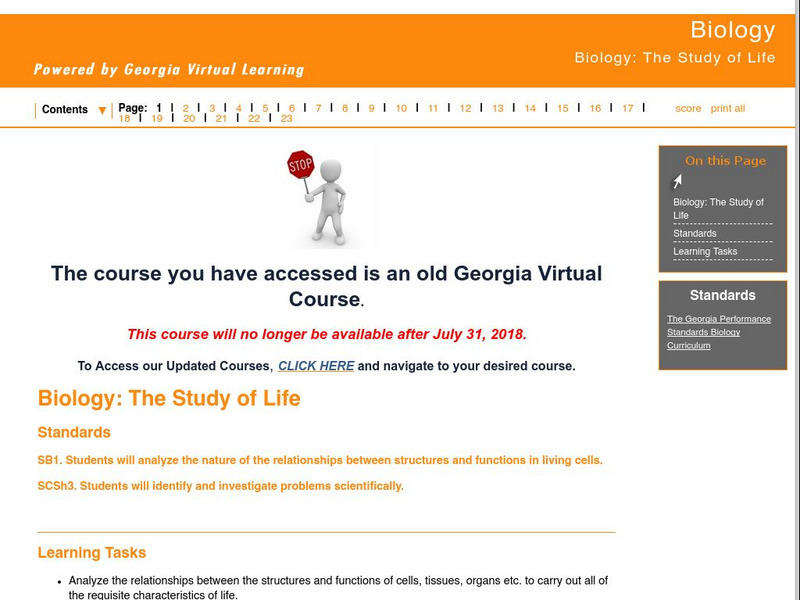Curated OER
The Fungus Among Us
Students explore the basic characteristics and roles of fungi. They discuss the importance of fungi to humans. Students investigate the relationship between cell structure and function and explore the diversity and variation of...
Curated OER
Cell Structure and DNA
Sixth graders identify, locate and describe the function of the parts of a cell. In groups, they state the five stages of mitosis and put them in the correct order. They are introduced to the structure of DNA and mRNA and how they...
Curated OER
Mitosis and Meiosis
Students model and differentiate between the processes of mitosis and meiosis. In partners, they use yarn and construction paper to create models for each of the phases of mitosis and meiosis then compare the chromosome numbers in each...
Curated OER
Meiosis
Students practice identifying the stages and purpose for meiosis. They use a worksheet to construct each phase, label its parts and describe the process occurring in each phase. they divide the process into meiosis I and meiosis II.
Curated OER
Mitosis
Students explore the four stages of mitosis. They view a prepared slide of an onion root tip undergoing mitosis to identify the stage for each cell in view. They record the number of cells in each stage, graph the results, then calcualte...
Curated OER
Cells
Students are introduced to the life cycle of a cell. In groups, they identify and describe the function of organelles. They compare and contrast the differences and similarities between plant and animal cells as well. They complete a...
Curated OER
Is It Alive?
Eighth graders define the boundaries of living organisms. They determine what makes something a living organism and identify factors that constitute "living." Pupils write a conclusion about the evidence they found that yeast is alive...
Curated OER
Cell Repair and Cell Cycle
Seventh graders explore the cell cycle. They view pictures of different stages of mitosis and explain why cells reproduce. They identify the five phases of mitosis: interphase, prophase, metaphase, anaphase, and telophase.
Curated OER
Cell Theory
Students state the three parts of cell theory. They identify the roles of the nucleus and cell membrane. They take notes from the overhead on cell theory. They answer true/false questions about cell theory.
Curated OER
It's Okay to Exhale: Photosynthesis and Cellular Respiration
Students will observe the differences between photosynthesis and cellular respiration. Then they observe the links due to climate changes and relate how climate change affects their lives.
Curated OER
The Giant Cell
After actively participating in a unit on cells, the students act out and become the organelles. They will act out and explain the functions of what each of the organelles do for the cell.
Curated OER
Spotlight on Photovoltaics and Fuel Cells
Students utilize Internet resources to uncover the pros and cons of two topics in alternative energy technology: photovoltaics and fuel cells. Students analyze the structure and function of each system to make observations about the...
Curated OER
Teaching Biotechnology With Models
Learners are introduced to biotechnology by using models. The teacher uses A Sourcebook of Biotechnology Activities, Rasmussen and Matheson project co directors. One of the activities in the book is: students use a scale models to very...
Curated OER
Extraction of DNA from Onion
Students experiment with DNA by isolating it from plant tissue. They investigate whole onions to prepare DNA. They complete the experiment to examine the structural characteristics of DNA.
Curated OER
Cell Transformation in Tobacco Leaf Disks
Learners review the basic principles of plant cell structure, tissue culture, sterile technique, and cell transformation. Next students complete a plant transformation experiment using whole plant material in order to view evidence of...
Curated OER
Generation of Action Potentials in Nitella Giant Algal Cells
Students observe cytoplasmic streaming in Nitella cells. They examine the conduction of a wave of depolarization across other membranes, such as the axons of neurons. Students predict the effects of sending a small electric current...
Curated OER
The Journey of a Red Blood Cell
Fifth graders examine how a red blood cell travels throughout the body. Using a model, they follow the flow of blood throughout the entire body. They identify the functions of the lungs and discuss the difference of the blood entering...
Curated OER
Study of the Cell
Students draw a diagram to show the fluid mosaic model of a membrane. They explain how hydrophobic and hydrophilic properties help membranes hold their shape. They identify the functions of different cell membrane proteins as well.
Curated OER
"Attack A Cell, Any Cell" Disease Unit
Seventh graders use the Internet to gather information about a disease. They also discuss in groups how diseases are a worldwide problem and brainstorm ideas they can help. They create an informational packet on the disease they researched.
Curated OER
Notes on Cell Organelles
Learners record information and write journal entries on the structure and function of cell organelles while viewing a Powerpoint presentation.
Curated OER
Plant And Animal Cells
Students identify parts of plant and animal cells and describe the functions of each part. They distinguish between plant and animal cells. After a lecture/demo, students perform experiments which help them construct models of plant and...
Curated OER
The Inside Story- Cells, Organs, and Systems of the Human Body
Fourth graders study the human body from cell level to the inter-relationships of the systems in this unit. Students practice study skills throughout the unit.
Curated OER
What Makes Me Who I Am?
Fifth graders analyze their genetics and look closely at cell interaction within their bodies in this unit. Students publish and share picture books.
Georgia Department of Education
Ga Virtual Learning: Biology: The Study of Life
A learning module where students analyze the relationships between the structures and functions of cells, tissues, organs to carry out all of the requisite characteristics of life. They also describe the scope of biological study and...









